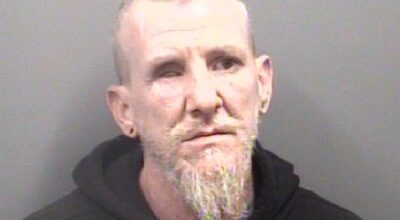Rowan County commissioners’ prayer practices again ruled unconstitutional
Published 10:02 am Friday, July 14, 2017

- County commissioners and attendees participate in a prayer during a meeting at the county administration building. Josh Bergeron/Salisbury Post
By Josh Bergeron
josh.bergeron@salisburypost.com
SALISBURY — By a 10-5 count, a federal court on Friday ruled that Rowan County commissioners’ prayer practices from 2007 to 2013 were unconstitutional.
The prayer case, which started in 2013, centers on the fact that commissioners gave overwhelmingly Christian prayers at the start of regularly scheduled meetings. Those prayers were given by commissioners and not a volunteer chaplain or other third party.
First, commissioners’ prayer practices were declared unconstitutional in 2015 by a district court in North Carolina. Next, a three-judge panel in 2016 ruled by a 2-1 count that commissioners’ prayer practices were constitutional.
Today’s ruling was made by the entire 4th Circuit Court of Appeals in Richmond, Virginia, meaning that all 15 active judges on the court heard oral arguments and rendered a ruling. By a 10-5 count, the 4th Circuit en banc panel affirmed the opinion of North Carolina’s Middle District Court. Friday’s ruling means that the U.S. Supreme Court is the only option left for appeal.
Reacting to Friday’s decision, lead plaintiff Nan Lund said she was glad to see the court found Rowan County’s prayer practices unconstitutional.
“No one in this community should fear being forced by government officials to participate in a prayer, or fear being discriminated against because they didn’t participate in a prayer before a meeting for all the public,” Lund said in a news release.
ACLU Legal Director Chris Brook, who represented the plaintiffs in the case, said the ruling was a great victory for the rights of all residents to participate in local government without fearing discrimination.
“We are very pleased that the full Fourth Circuit has upheld a bedrock principle of the First Amendment: that government should not be in the business of promoting one set of religious beliefs over others,” Brook said in a news release.
The National Center of Life and Liberty represents Rowan County at no charge in the prayer lawsuit.
Judge J. Harvie Wilkinson wrote the majority opinion for the court. Judge Diana Gribbon Motz wrote a concurring opinion. Judge G. Steven Agee wrote a dissenting opinion. Judge Paul V. Niemeyer wrote another dissenting opinion.
The specific combination of elements used in the majority opinion to declare prayer practices unconstitutional include: commissioners being the only prayer-givers, invocations drawing overwhelmingly on Christianity and sometimes advancing that faith, asking attendees to participate and the local government setting.
“As the exclusive prayer-givers, Rowan County’s elected representatives — the very embodiment of the state —delivered sectarian invocations referencing one and only one religion,” he wrote. “They asked their constituents to join them in worship. They did so at every meeting of a local governing body for many years.”
A case known as Greece v. Galloway had been cited prominently in Rowan County’s case. Wilkinson said that Rowan County’s case was different than the Greece case because prayers were “exclusively prepared and controlled and delivered by the government.” He said that’s a much greater level of involvement than in Greece, where volunteer chaplains were permitted to offer invocations.
“Our Constitution seeks to preserve religious liberty without courting religious animosity,” Wilkinson wrote in the majority opinion. “In this quest, our two religion clauses have been a great success, helping to spare Americans the depth of religious strife that so many societies have had to suffer and endure. And yet free religious exercise can only remain free if not influenced and directed by the hand of the state. On this score, the county simply went too far.”
Wilkinson criticized the dissenting opinion for only considering Rowan County commissioners’ prayer practices in pieces rather than holistically.
In the dissenting opinion, Agee pushed back against that assessment.
“The majority’s invocation of balancing factors and viewing otherwise valid principles ‘holistically’ in order to reach a preferred result is no camouflage for its lack of merit,” he wrote. “In short, the majority misapplies Town of Greece’s assessment of how the factors are to be evaluated both individually and in tandem.”
Continuing, he wrote that the majority immediately attached a significance to the fact that lawmakers, instead of clergy, offered the prayers. He said previous, relevant court cases did not attach a particular significance to the identity of the speakers.
“Moreover, the tradition and history of lawmaker-led prayers is as prevalent as that of other legislative prayer givers,” he wrote. “Thus, contrary to the majority’s suggestion, the fact that the Supreme Court has not specifically addressed lawmaker-led prayer signifies nothing.”
Rowan County’s prayers fall within the traditional legislative prayer practices recognized in past court cases, Agee wrote.
Asked about the decision, Rowan County Commissioners Chairman Greg Edds said he couldn’t announce whether he would vote to appeal the ruling. When reached, Edds said he had only just found out about the 4th Circuit’s ruling.
He said the court’s decision wasn’t surprising.
Edds said he spoke with the county’s attorneys on Friday and asked them to discuss next steps in the case with Rowan County commissioners. Commissioners will need to speak with attorneys before a decision is made to appeal the ruling to the U.S. Supreme Court, he said.
County Commissioner Craig Pierce said he’s already prepared to appeal the ruling. When asked on Friday, Pierce said he would be willing to vote to appeal to the U.S. Supreme Court. Two more commissioners would also need to vote to appeal.
Pierce expressed frustration about the way in which courts have handled the case.
“If you go back through the courts enough, sooner or later they’re going to give you the answer you want,” Pierce said.
With the lawsuit ongoing, Rowan County commissioners, themselves, have abstained from giving prayers at the start of meetings. Instead, they have invited Rowan County Sheriff’s Office Chaplain Michael Taylor or his son to offer opening invocations.
Contact reporter Josh Bergeron at 704-797-4246





